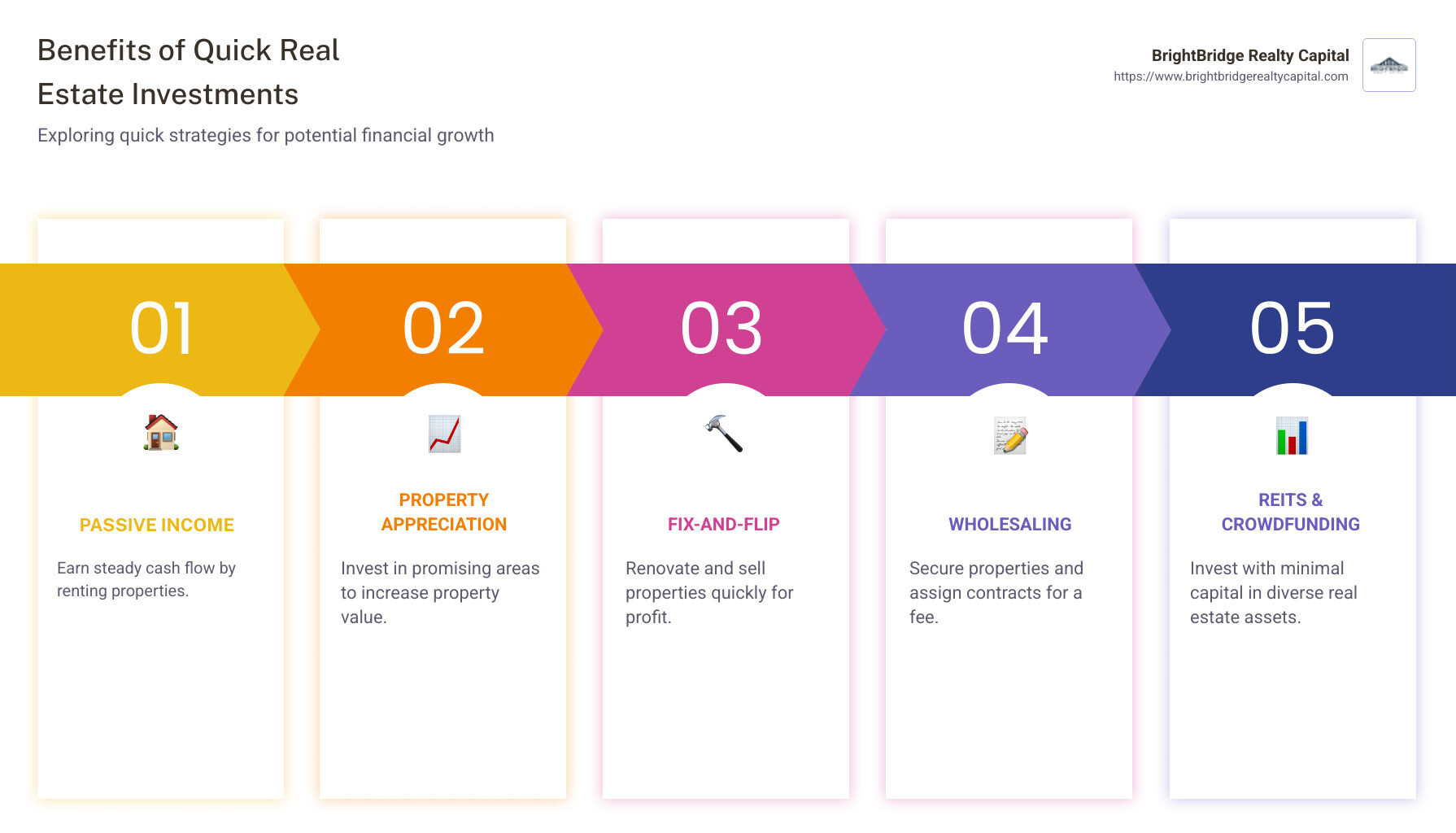Quick Wins: Top Methods for Real Estate Investments

Quick real estate investments can be the key to open uping financial growth through property. For those looking to dive into real estate, you'll find paths leading to passive income and potential for property appreciation. Imagine earning money while you sleep—through renting properties or watching their values increase over time.
Here's a glimpse into the benefits:
- Passive Income: Achieved by renting properties, offering steady cash flow.
- Property Appreciation: Investing in up-and-coming areas may lead to increased property value.
- Quick Profit Potentials: Exciting options like fix-and-flip where you buy, renovate, and sell properties quickly for profit.
Real estate is more than buying and selling; it's about making informed decisions that can lead to substantial financial outcomes. Here at BrightBridge Realty Capital in New York, NY, we specialize in offering innovative, quick funding solutions to seize these lucrative opportunities. Whether you’re after regular rental income or aiming for property appreciation, our guide will help illuminate the path to successful real estate investing.

Quick Real Estate Investments
When it comes to quick real estate investments, several strategies stand out for their potential to deliver fast returns. Let's explore some popular short-term strategies:
Fix-and-Flip
Fix-and-flip is all about buying properties, renovating them, and selling them quickly for a profit. This strategy can offer returns of over 15%, but it requires a keen eye for undervalued properties and a knack for renovation. You'll need substantial capital upfront and the ability to steer changing market conditions.
Wholesaling
Wholesaling involves finding undervalued properties, securing them under contract, and then selling that contract to another buyer. It's a way to invest in real estate without actually owning the property. The key to success is having a strong network of buyers ready to snap up deals.
Real Estate Investment Trusts (REITs)
For those who prefer a less hands-on approach, REITs offer a way to invest in real estate without owning physical property. They work like mutual funds, allowing you to invest in a portfolio of properties. REITs often pay high dividends, making them a favorite for those seeking regular income.
Crowdfunding
Real estate crowdfunding platforms connect investors with developers looking for funding. This method allows you to invest in real estate projects without needing a large amount of capital. While it offers the chance to earn passive income, it also involves risks like illiquidity and market fluctuations.

These strategies provide a mix of hands-on and passive investment options, catering to different risk appetites and financial goals. Whether you're flipping houses or investing in REITs, quick real estate investments can be a powerful tool for building wealth.
Top Short-Term Real Estate Investment Strategies
When you're looking for quick real estate investments, these strategies can help you achieve fast returns without long-term commitments. Let's explore the top short-term investment methods:
Fix-and-Flip
Fix-and-flip is a popular strategy where investors buy a distressed property, renovate it, and sell it for a profit. This approach can yield high returns, sometimes over 15%, but it requires significant capital and market savvy. The key is to find undervalued properties and manage renovation costs effectively. A good fix-and-flip can be completed in a few months, but be prepared for market fluctuations that might affect your selling price.
Wholesaling
With wholesaling, you don't need to own the property. Instead, you find a property, get it under contract, and then sell the contract to another buyer for a profit. This strategy is perfect for those with a keen eye for deals and a strong network of potential buyers. The main risk is not finding a buyer in time, which can leave you holding a contract for a property you don't want.
Land Development
Land development involves buying raw land and preparing it for sale or construction. This strategy requires expertise in zoning laws and market research. While it can be more complex, the rewards can be substantial if you develop in an area with high demand. Be aware of the upfront costs and the time needed for permits and preparation.
Short-Term Rentals
The rise of platforms like Airbnb has made short-term rentals a lucrative option. By renting out properties in tourist hotspots, investors can earn higher nightly rates compared to traditional leases. However, this strategy requires diligent property management and awareness of local rental laws. The potential for high cash flow is balanced by the risks of vacancy and maintenance costs.
House Hacking
House hacking is a creative way to turn your own home into an investment. By renting out a portion of your home, like a basement or a room, you can offset your mortgage and potentially live for free. It's an ideal strategy for first-time investors who want to dip their toes into real estate without significant risk. This approach can also provide valuable experience for future property investments.
These strategies offer various paths to profit in the real estate market, catering to different levels of experience and capital availability. Whether you're flipping homes or renting out a spare room, quick real estate investments can be a smart way to grow your wealth without tying up resources long-term.
Real Estate Investment Trusts (REITs)
If you're seeking quick real estate investments with a focus on generating passive income, Real Estate Investment Trusts (REITs) might be an option to consider. While BrightBridge Realty Capital specializes in providing tailored real estate financing solutions, understanding REITs can offer insights into the broader real estate investment landscape. Here's how they work and why they can be a lucrative option:
Dividend Yields
REITs are known for their attractive dividend yields. By law, these trusts must distribute at least 90% of their taxable income to shareholders as dividends. This makes them a popular choice for investors looking for consistent income streams. With dividends often higher than those of typical stocks, REITs can be a compelling option for income-focused investors.
Stock Market
REITs are traded on major stock exchanges, similar to other stocks. This means they offer the liquidity that traditional real estate investments do not. You can buy and sell REIT shares with ease, making it simple to adjust your investment portfolio as market conditions change. This liquidity is a significant advantage for investors who want flexibility and quick access to their funds.
Passive Income
One of the most appealing aspects of REITs is the potential for passive income. Since REITs manage a diversified portfolio of income-generating properties, investors receive regular dividend payments without the need to actively manage any properties themselves. This hands-off approach allows you to enjoy the benefits of real estate investment while focusing on other ventures or simply enjoying your free time.
In summary, while BrightBridge Realty Capital focuses on providing financing solutions, understanding REITs can provide a broader perspective on real estate investments. They combine the benefits of high dividend yields, stock market liquidity, and passive income. Whether you're new to real estate investing or a seasoned pro, exploring different investment avenues can play a vital role in a diversified investment strategy.
Real Estate Crowdfunding and Syndication
For those interested in quick real estate investments without the need to directly manage properties, real estate crowdfunding and syndication present exciting opportunities. Both methods allow investors to pool resources and share in the profits of real estate projects, but they differ in structure and potential returns.
Crowdfunding Platforms
Real estate crowdfunding platforms are online marketplaces where investors can fund real estate projects. These platforms connect developers with investors who are eager to finance projects through debt or equity.
One of the key benefits of crowdfunding is the ability to invest in real estate with relatively small amounts of capital. Minimum investments can range from as low as $500 to $25,000, making it accessible to a wide range of investors. This approach offers diversification across various projects and locations, reducing the risk associated with investing in a single property.
However, it's important to note that crowdfunding investments can be illiquid. Funds are often locked up for several years, and the projects can carry significant risks. Despite these challenges, top platforms have reported annualized returns of 2% to 20%, according to Investopedia.
Syndication
Real estate syndication is another collaborative investment method. Unlike crowdfunding, syndication involves forming a partnership or an LLC where investors become members. This structure gives investors an equity stake in the property, meaning they share in both the profits and potential appreciation of the real estate.
Syndication provides a more stable ownership structure compared to crowdfunding. Investors have a say in the management and can benefit from tax advantages related to property ownership. However, it requires a higher level of involvement and often larger capital commitments.
Equity Stake
An equity stake in real estate means owning a portion of the property or the entity that holds it. This can be achieved through syndication, where investors are part-owners, or through certain crowdfunding projects offering equity positions.
Having an equity stake allows investors to benefit from property appreciation and rental income. It also means sharing in the risks associated with property ownership, such as market fluctuations and management challenges. For those seeking long-term growth and income, an equity stake in real estate can be a rewarding addition to their investment portfolio.
In conclusion, both crowdfunding and syndication offer unique ways to invest in real estate without direct property management. By leveraging these methods, investors can enjoy the benefits of real estate ownership, including potential high returns and diversification, while minimizing the hands-on work typically associated with property investments.
Frequently Asked Questions about Quick Real Estate Investments
How can I start investing in real estate with little money?
Starting with quick real estate investments doesn't have to be expensive. Here are a few ways to get started with limited funds:
Local Grants: Some cities offer grants to encourage real estate development. These can help cover costs for renovations or even initial purchases. Check with your local government or housing authority for available programs.
Crowdfunding: Real estate crowdfunding platforms allow you to invest small amounts, sometimes as low as $500. This method lets you pool resources with other investors to fund larger projects. It's a way to gain exposure to real estate without needing a large upfront capital.
REITs: Real Estate Investment Trusts (REITs) are another accessible option. You can buy shares in a REIT just like stocks. This approach allows you to invest in real estate without owning physical property. REITs often pay dividends, providing a potential income stream.
What are the risks of short-term real estate investments?
Short-term real estate investments can be rewarding but come with their own set of risks:
Market Conditions: Real estate markets can be volatile. Changes in the economy or local market trends can impact property values and rental demand. It's crucial to stay informed about market conditions to make timely decisions.
Capital Requirements: Some short-term strategies, like fix-and-flip, require significant capital upfront. This includes costs for purchasing and renovating properties. If market conditions change, you might face challenges selling the property at a profit.
Regulations: Regulations can affect your investment. For instance, local laws might change around short-term rentals, impacting potential income. Always check zoning laws and rental regulations before investing.
How do I choose the best real estate investment strategy?
Choosing the right strategy depends on several factors:
Risk Tolerance: Assess how much risk you're willing to take. Some strategies, like wholesaling, involve less risk but may also offer lower returns. Others, like fix-and-flip, have higher potential returns but also higher risks.
Investment Goals: Define your goals. Are you looking for quick profits, long-term growth, or steady income? Your goals will guide your choice of strategy.
Market Research: Conduct thorough research on the market and specific properties. Understanding the local market dynamics can help you identify opportunities and avoid pitfalls. Look at historical trends, current demand, and future projections.
By considering these factors, you can choose a real estate investment strategy that aligns with your financial goals and risk appetite. This thoughtful approach can help you steer the complex world of real estate investing with confidence.
Conclusion
At BrightBridge Realty Capital, we specialize in providing quick real estate investments with our fast closings and flexible funding options. Our mission is to support real estate investors in seizing opportunities without the usual delays and problems.
Fast Closings: We understand that timing is crucial in real estate. That's why we offer swift closings, often within just a week. This speed allows you to act quickly and confidently in a competitive market.
Flexible Funding: Every investment is unique, and so are our financing solutions. We tailor our loans to meet your specific needs, whether you're flipping, building, or growing a rental portfolio. Our direct lending approach ensures competitive rates and a seamless process.
Real estate investing doesn't have to be daunting. With our expertise and dedicated support, you can focus on what you do best—making smart investment decisions.
Ready to explore your options? Learn more about our services and how we can help you succeed in your real estate investment journey.


